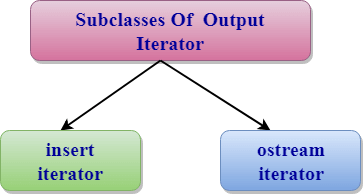C++ Output Iterator
- Output Iterator is an iterator used to modify the value in the container.
- Dereferencing an output iterator allows us to alter the value of the container.
- It does not allow us to read the value from the container.
- It is a one-way and write-only iterator.
- It can be incremented, but cannot be decremented.
- Operators that can be used for an output iterator are increment operator(++), decrement operator(--) and assignment operator(=).
- There are two main subclasses of an Output Iterator are:
- insert iterator
- ostream iterator

Insert Iterator
- An insert iterator is an iterator used to insert the element in a specified position.
- An assignment operator on the insert_iterator inserts the new element at the current position.
Syntax
Parameters
x: It is the container on which the new element is to be inserted.
it: It is an iterator object pointing to the position which is to be modified.
Let's see a simple example:
Output:
Elements of v1 are : 1 2 3 3 4 5 6 7 4 5
In the above example, insert_iterator is applied on the copy algorithm to insert the elements of the vector v2 into the vector v1 at a specified position pointed by it.
Ostream iterator
- An ostream iterators are the output iterators used to write to the output stream such as cout successively.
- An ostream iterator is created using a basic_ostream object.
- When an assigenment operator is used on the ostream iterator, it inserts a new element into the output stream.
Syntax
Member functions of Ostream Iterator class
Parameters
- T: It is the type of elements to be inserted into the container.
- charT: The type of elements that ostream can handle, for example, char ostream.
- traits: These are the character traits that the stream handles for the elements.
Let's see a simple example:
Output:
In the above example, out is an object of the ostream_iterator used to add the delimiter ',' between the vector elements.
Let's see another simple example of ostream iterator:
Output:
Features Of Output Iterator
- Equality/Inequality Operator: Output iterators cannot be compared either by using equality or inequality operator. Suppose X and Y are the two iterators:
- Dereferencing: An output iterator can be dereferenced as an lvalue.
- Incrementable: An output iterator can be incremented by using operator++() function.
Limitations Of Output Iterator
- Assigning but no accessing: We can assign an output iterator as an lvalue, but we cannot access them as an rvalue.
Suppose 'A' is an output iterator type and 'x' is a integer variable:
- It cannot be decremented: We can increment the output iterator by using operator++() function, but we cannot decrement the output iterator.
Suppose 'A' is an output iterator type:
- Multi-pass algorithm: An output iterator cannot be used as a multi-pass algorithm. Since an output iterator is unidirectional and can move only forward. Therefore, it cannot be used to move through the container multiple times
- Relational Operators: An output iterator cannot be compared by using any of the relational operators.
Suppose 'A' and 'B' are the two iterators:
- Arithmetic Operators: An output iterator cannot be used with the arithmetic operators. Therefore, we can say that the output iterator only moves forward in a sequential manner.
Suppose 'A' is an output iterator:
| 
 For Videos Join Our Youtube Channel: Join Now
For Videos Join Our Youtube Channel: Join Now









